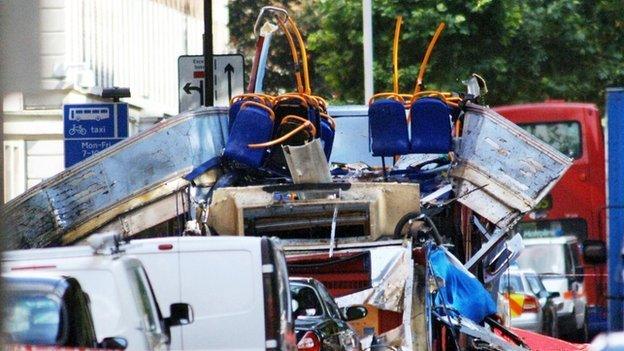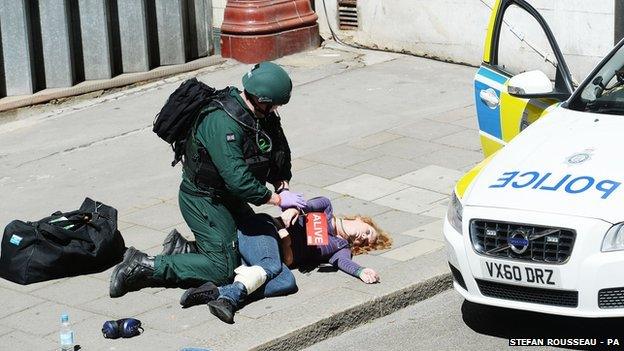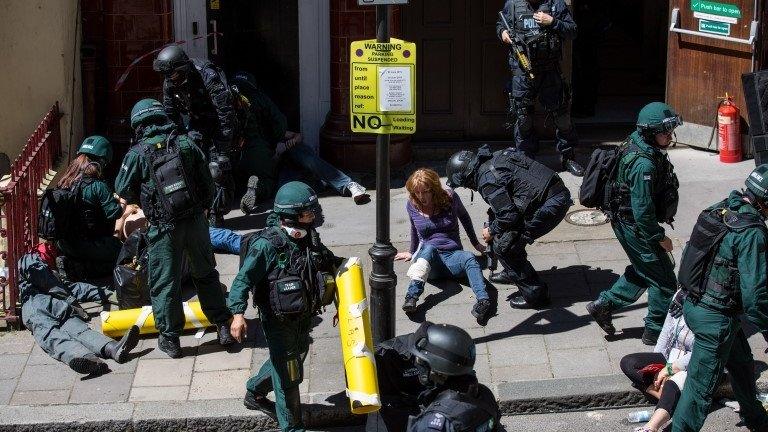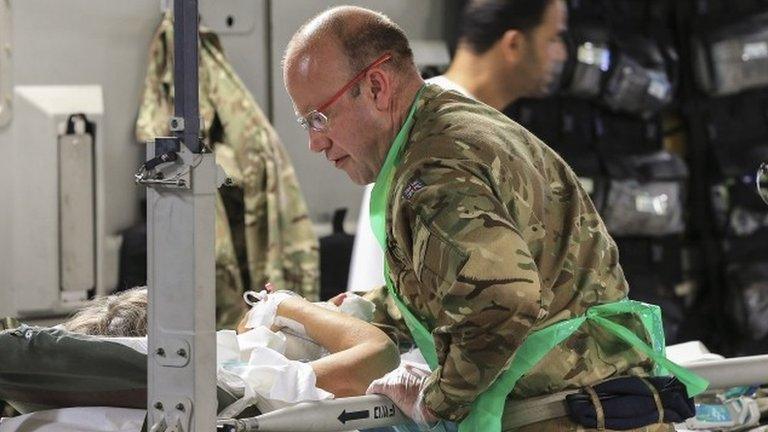7/7 attacks: Ten years on, how safe is the UK?
- Published

Four bombs on three Tubes and a bus killed 52 and injured many more in 2005
Almost exactly 10 years ago, Londoners saw the bleeding and the injured emerge from the Underground - survivors of the 7 July bomb attacks.
The four bombs on three Tubes and a bus killed 52 and left many more with life-changing injuries.
There was no longer any doubt, al-Qaeda's brand of violent extremism was capable of hitting the UK.
The tenth anniversary of those attacks is now a week away. So are we safer or under a greater threat?
'Severe threat'
The official government position, for headline purposes, is that there is a "severe" threat from international terrorism, which means security chiefs have concluded an attack is highly likely.
This conclusion is not an exercise of sticking a finger in the air and seeing which way the wind blows. It is based on some cold, hard calculations of what the intelligence picture suggests is going on, both what we can see in the public and what we can't.

Police in London are staging a major counter-terrorism exercise
And that is why London sees a major counter-terrorism exercise this week, codenamed Operation Strong Tower and designed to test to the limit how the police and other emergency services would respond should the worst come to pass.
Over the last decade, the nature of threat from extremist violence has changed.
The 7/7 attacks were directed at arms length by al-Qaeda in Pakistan and Afghanistan.
A number of other plots during the same period followed the same trajectory, including the foiled attempt to take liquid-based bombs onto transatlantic airliners in 2006.
Drone attacks
But as the US tightened the noose around al-Qaeda's leadership, particularly after it began firing missiles from drones, the would-be jihadists briefly shifted attention to the Horn of Africa.
Deprived of an easy route to one hoped-for land of jihad, British recruits tried to get to Somalia to join al-Shabab. One of those would-be recruits was Michael Adebolajo, one of the two men who killed Fusilier Lee Rigby in Woolwich.
Aside from that attack, the number of major plots had appeared to be falling as al-Qaeda increasingly looked a spent force and al-Shabab too weak and remote to take up its banner.
But the implosion of three countries in the wake of the Arab Spring has changed things yet again. First Libya, then Syria and Iraq. In the remains of each nation, the jihadist cause has found a new lease of life.
The group that calls itself Islamic State has projected a utopian image of a resurrected caliphate and, simultaneously, presented its sectarian ultra-violence as a solution to Sunni Muslims who have suffered in both Iraq and Syria.
That toxic revolutionary mix, projected by young followers through social media, and further wrapped up in an arcane prophesy that the "end times" will begin in a Syrian town, has been its trump card.
Sceptics say all of this poses no threat to us in the UK - but there is overwhelming evidence to the contrary.
Extreme violence
If Tunisia's events were not clear enough, France, Australia, Canada and Belgium have all seen acts of extreme violence that were either directly or indirectly inspired by the ideology and aims of ISIS.

France's worst security crisis in decades began with a massacre at Charlie Hebdo
The UK has not suffered an act of ISIS-inspired violence on its streets - but there have been at least two major counter-terrorism operations which can be directly linked to conspirators receiving directions or guidance from jihadists active in the Syrian conflict.
More than 330 people were arrested on suspicion of terrorism offences in the UK in the year to April 2015 - a third more than the previous year.
Crucially, the average age of those being arrested has been falling, with almost a fifth under 20.
In other words, given that the self-proclaimed caliphate isn't going away anytime soon, this is shaping up to be an enduring security problem.
While the jihadist threat persists, the UK also runs the risk of more violence from far-right extremists. One of the most serious acts of terrorism since 7/7 came from a neo-Nazi who tried to bomb three West Midlands mosques and murdered an elderly Muslim man as he returned home from prayers.
That is why London's massive counter-terrorism training exercise over Tuesday and Wednesday is important to the security services.
The emergency services believe they are in a far better place to deal with a repeat of 7/7 - their secure communications systems now all talk to each other, for a start.
But they don't know what's coming around the corner.
Operation Strong Tower, which is focused on a "marauding" attack, such as the shootings in Mumbai or Paris, is the latest and most complex event to date - and it won't be the last.
- Published30 June 2015

- Published30 June 2015
